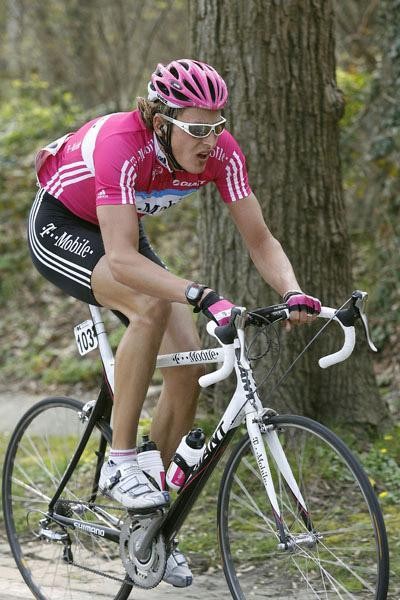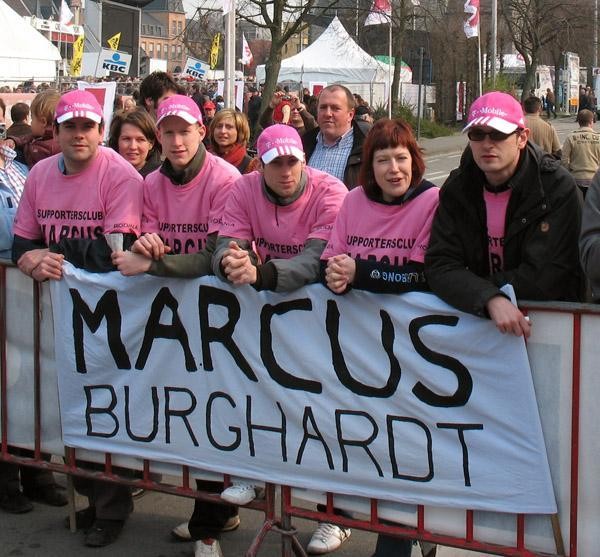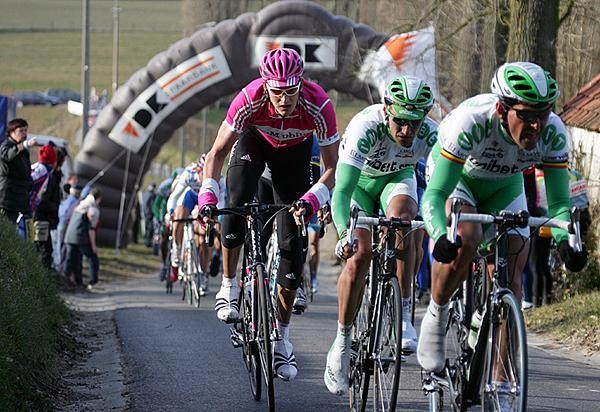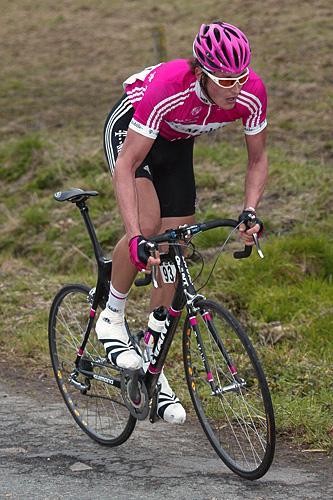T-Mobile's up-and-coming Classics specialist
T-Mobile's Marcus Burghardt is bouncing back from an injury-filled 2006 season to become the team's...




An interview with Marcus Burghardt, April 7, 2007
T-Mobile's Marcus Burghardt is bouncing back from an injury-filled 2006 season to become the team's captain in the Spring Classics, a role he feels he handles well. Cyclingnews' Susan Westemeyer caught up with him before the Ronde van Vlaanderen.
2006 was a bad year for young Marcus Burghardt. Knee problems caused him to miss much of the season and his two-year contract with T-Mobile team was coming to an end. A new wind was blowing through the team, bringing a new management, and Burghardt didn't know if he was going to be a part of the "new" team or not.
Fast forward to March 31, 2007 and Burghardt stood on the podium of the E3 Prijs in Harelbeke, Belgium, having finished third in the race, which he went in to as T-Mobile's captain. And he is heading to the Ronde van Vlaanderen on Sunday not only as the team's co-captain, but also with a three-star recommendation from the Belgian newspaper Het Nieuwsblatt.
He is only 23 years-old but self-confident and calm about his new responsibilities. "After our captain Andreas Klier had to withdraw a day before Dwars door Vlaanderen one of us had to take over the responsibility. I was pretty satisfied with my form in Paris-Nice and came out of that race well," he said.
"I made a short training camp with my trainer Thomas Schediwe on Mallorca and I saw there that my form was good. So it was no problem for me to take over the captain's role."
Burghardt showed his good Classics form in Dwars door Vlaanderen, where he was one of the most aggressive riders and was part of the final leading group. He tried to get away in the final kilometre, but the Quick-Step train was too much for him, and he finished nine seconds down in 26th place.
The latest race content, interviews, features, reviews and expert buying guides, direct to your inbox!
"I attacked too much in that race, which cost me a lot of strength, but I wanted to clear things up in the climbs. The finale in Waregem wasn't hard enough, and so everyone came back together," he summarized. "But on the other hand, it could have gone well. If I hadn't attacked and ended up being 10th, that wouldn't have brought me much, either."
Things went better a few days later in Harelbeke. He was constantly visible at the front of the race, and when World Champion Tom Boonen attacked on a final cobblestone climb, the young German was one of the few to go with him.
Unfortunately, Burghardt found himself in a group with two outstanding sprinters, Boonen and Fabian Cancellara, and not only that, found himself leading out the sprint. But he was happy enough with his third-place finish behind the two stars.
Looking back at the race, he said, "At E3 I attacked on the Knokteberg climb, and that caused the group to sort of fall apart. It was clear to me that I would not be able to get rid of Boonen and Cancellara but at least I tried. And I went into the sprint with a gear much too large."
Boonen was impressed with how Burghardt rode, and he said, "I have to admit that the young German was unbelievably strong on the hills." The compliment pleased the T-Mobile rider, who responded, "I am happy to hear that and it gives me a lot of morale and self-confidence."
Does he think that now the other top riders know him and take him seriously? "I don't know if you can say that, but I think the riders respect each other, I have a good relationship with a lot of other riders and some knew me before. When you ride with your colleagues five hours a day, wheel on wheel, you get to know each other."
He doesn't know whether he will be the team's captain for the remaining spring classics, or whether he will share that role with Kim Kirchen. "We haven't spoken about that, it is up to the team management." But he is confident. "I think that I have shown twice that I can handle the captain's role well, even if I am only 23 years-old." However, he puts the emphasis on the team rather than on any individual rider. "The important thing is that the team rides well together as in the last few races, so that one of us is as far forward as possible."
The team's original plan for Burghardt this year was for him to move to the Apache, Germany, area for the spring season, near to the races. He previously lived in Chemnitz, Germany, where the problem was transportation. "Last year it was difficult for me to get to the races in Belgium. I had to spend too much time travelling."
So, along with everything else that was changing over the summer, he moved to the small town of Auenstein, Switzerland, conveniently located near Zürich and Basel, and the airports. He has good flight connections to Brussels now, and during the busiest part of the season, stays in Belgium between races, which also allows him to train with his teammates.
All in all, 2006 was "a very difficult time for me. It's especially hard when you have to make a break but don't want to, and your future is uncertain. In this time the support of my family and my trainer were very important. It was very important that some people still stood behind me at this time." Not everyone was so helpful. "On the other hand, I was rather disappointed that a lot of people wrote me off rather quickly and didn't have any trust in me."
Constant pain in his left knee kept him out of races and off the bike much of last summer. He finally underwent surgery in August, which cleared up the problem. At the team's training camp on Mallorca in January he said that he was still building up the muscles in the affected leg . He continued with strength training and "worked a lot with the doctors and therapists," with obviously good results.
It's sometimes hard to remember that the tall youngster is only in his third pro year. How does he feel in his role as a pro rider? "Well, it's a very, very hard life that we have as a pro cyclists," he joked.
He notes that he has changed in those three years, preparing himself now more professionally and concentrating more on his training. "I think that my training is quieter but more effective," he reflected. "Plus, I have tried to optimise my environment. That included my move to Switzerland. I had better opportunities to get to races and live closer to my trainer, Thomas Schediwe."
It wasn't a light decision for the young man, but it helped that girlfriend Svenja went with him. "It was not an easy thing to do, because the support I had at home from my family, friends, trainer in Chemnitz, sponsors and my old cycling club, the RSV 54 Venusberg, was very important to me."
There are other changes, too. "The team also gives us lots of possibilities to improve ourselves outside of training. I have built myself up a little team with a physiotherapist, nutritional advisor, and of course my trainer Thomas Schediwe and my manager Tony Rominger."
He doesn't yet know what will come after the Spring Classics. "I haven't yet thought about that. I am concentrating on the Ronde van Vlaanderen as the next race and then we'll look to Gent-Wevelgem and Roubaix."
Looking further into the future, he also doesn't yet know where he will be riding next year. He has only a one-year contract with the magenta team. "I don't believe that this is the right time to think about that," he noted. "Right now I just want to concentrate 100 percent on my next race. And later we will look at which jersey I will be wearing next year."
Burghardt is supportive of T-Mobile's antidoping program, and noted that he has already been tested 13 times this season. "Five times out of competition and eight times at races."
"The way that our team and we as riders are going is surely the only way," he said. "Otherwise cycling would lose more sponsors and the media interest would decline. And our fans have a right to a fair sport.
"Fortunately, a number of teams have taken the same direction as T-Mobile," Burghardt continued. "As a rider, you have to keep in mind what this sport gives you. I find training is a lot of fun, and I enjoyed measuring myself against others in competition."
"It was no problem for me to accept his program," he said, and defended his beloved sport. "Our fans, the U-13 riders, the students, the young riders, they shouldn't have the feeling that is being spread by the media, that all pros can only bring results through the use of banned products. Through the stronger and improved controls we are surely on the right path to restore cycling's believability."
Read Cyclingnews' 2005 interview with Burghardt.

